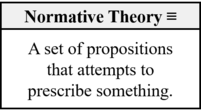Normative Theory
What is normative theory? How should it be defined?
While some propositions attempt to describe and explain the world, others prescribe how things ought to be, what is right and what is wrong, what is acceptable and what is not. It is important to provide this class of propositions with a proper scientonomic definition.
In the scientonomic context, this term was first used by Zoe Sebastien in 2015. The term is currently accepted by Scientonomy community.
In Scientonomy, the accepted definition of the term is:
- A set of propositions that attempts to prescribe something.
Contents
Scientonomic History
Acceptance Record
| Community | Accepted From | Acceptance Indicators | Still Accepted | Accepted Until | Rejection Indicators |
|---|---|---|---|---|---|
| Scientonomy | 1 January 2016 | It was acknowledged as an open question by the Scientonomy Seminar 2015. | Yes |
All Theories
| Theory | Formulation | Formulated In |
|---|---|---|
| Normative Theory (Sebastien-2016) | A set of propositions that attempts to prescribe something. | 2016 |
If an answer to this question is missing, please click here to add it.
Accepted Theories
| Community | Theory | Accepted From | Accepted Until |
|---|---|---|---|
| Scientonomy | Normative Theory (Sebastien-2016) | 15 February 2017 |
Suggested Modifications
| Modification | Community | Date Suggested | Summary | Verdict | Verdict Rationale | Date Assessed |
|---|---|---|---|---|---|---|
| Sciento-2016-0002 | Scientonomy | 3 September 2016 | Accept a new taxonomy for theory, normative theory, descriptive theory to reintroduce normative propositions (such as those of ethics or methodology) to the scientific mosaic. | Not Accepted | Since this modification consisted of two interrelated but essentially distinct suggestions - one definitional and one ontological - it was decided by the community to divide it into two modifications so that the gist of the proposed suggestions is properly articulated. In particular, it was agreed that there are two modifications in "the heart of this single modification - one ontological, the other definitional".c1 It was also agreed that the current formulation "is exclusively definitional, and does not give the community an opportunity to appreciate (and, well, accept) the ontological changes that come along with it".c2 Consequently, it was decided to divide this modification into two modifications - one definitional and one ontological.c3 | 23 January 2017 |
| Sciento-2017-0001 | Scientonomy | 23 January 2017 | Accept new definitions for theory, normative theory, and descriptive theory. Also, modify the definition of methodology to reflect these changes. | Accepted | The community agreed that this is "an important addition to theoretical scientonomy".c1 It was agreed that since "the paradox of normative propositions has been solved, a revised set of definitions was needed".c2 It was emphasized that if we're going to have any sort of conversation on the status of normative propositions in the mosaic, "then we need to start from a definition".c3 | 15 February 2017 |
Current View
In Scientonomy, the accepted definition of the term is Normative Theory (Sebastien-2016).
Normative Theory (Sebastien-2016) states: "A set of propositions that attempts to prescribe something."
While not explicitly stated, the definition assumes that normative propositions involve evaluation, i.e. they "say how something ought to be, what's good or bad, what's right or wrong".1p. 12 In contrast with descriptive propositions, normative propositions do not aim to tell how things are, were, or will be, but rather what is good or bad, desirable or undesirable, permissible or impermissible.
Related Topics
References
- ^ Barseghyan, Hakob. (2015) The Laws of Scientific Change. Springer.
